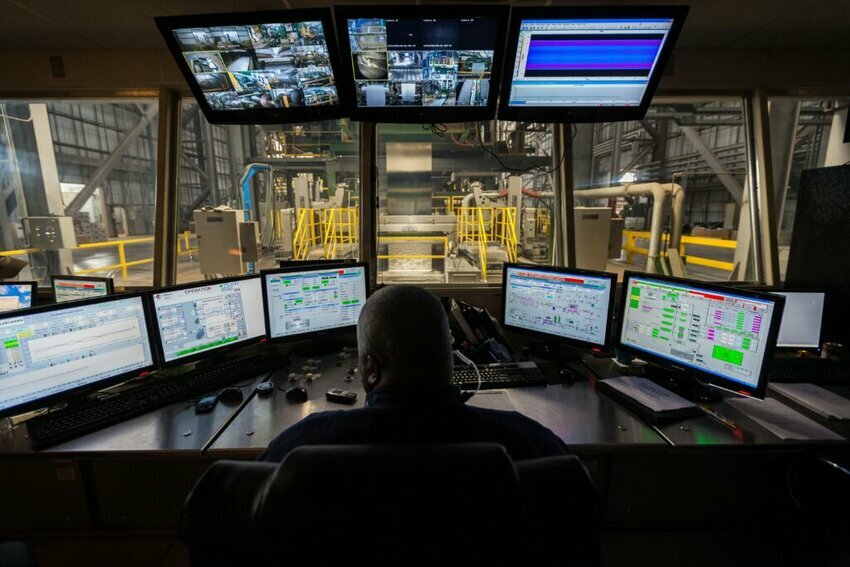
Nucor Corp. manufactures steel and steel products, with operating facilities in the United States, Canada, and Mexico. It is based in Charlotte, N.C. — the largest steel maker in this country and North America’s biggest recycler. It uses electric arc furnaces to melt scrap steel, whereas many other manufacturers use blast furnaces to melt iron. The former is a cleaner production method, resulting in fewer greenhouse gas emissions. Nucor prides itself on being a sustainable steel producer.
What are Nucor’s greenhouse gas reduction goals?
It says its greenhouse gas emissions from steel mills are 25%-%33 of the global average. Nucor has committed to an additional 35% combined reduction in steel mill scopes 1 scope 2 greenhouse gas intensity by 2030 using the 2015 baseline. That is 77% less than the global average. (Scope 1 refers to its internal operations and scope 2 refers to the electricity it buys from third parties.) The company will continue to disclose its scope 3 emissions tied to its supply chain.
Specifically, greenhouse gas emissions are 0.47 tons of CO2 per ton of steel. By 2030, it says it will reduce those intensity levels to 0.38 tons of CO2 per ton of steel. It aims to be net zero by 2050. The company is also deploying energy efficiency technologies, investing in renewables, and pursuing carbon capture and storage. In the area of energy efficiency, its sheet group rolling mills have reduced heat losses by 95%. At another plant, it has decreased natural gas usage by 75%.
It expects to cover 10% of current steel mill electricity from power purchase agreements — long-term contracts that guarantee the construction of wind and solar facilities; the company has three such agreements.
“Nucor's use of recycled scrap-based electric arc furnace technology at all of its 24 U.S. mills enables us to operate at 70% below the current GHG intensity for the steel industry,” the company says.
The company’s brand of steel — called Econiq — is also environmentally friendly, utilizing 100% renewable electricity and high-quality carbon offsets to mitigate the remaining Scope 1 and 2 emissions. Nucor says Econiq is the first carbon-neutral steel to be offered mass-produced. The target audience: the automotive, construction, and renewable industries. Its first customer is General Motors.
“The green economy is being built on steel,” says Leon Topalian, chief executive of Nucor. “Nucor is proving that it can be produced in a sustainable way that can help the world meet its climate goals. For more than 50 years, Nucor has been built on a sustainable model of recycling steel to produce new steel and steel products.”
In the United States, the steel sector has cut its energy intensity by 35% since 1990, adds Nucor spokeswoman Katherine Miller in a Charlotte Business Journal news story. And greenhouse gas emissions have fallen by 37% over the same time.
Steel goes into everything imaginable. But producing the product is carbon intensive. The industry is trying to reduce its CO2 emissions by using recycled scrap and renewable energy to power the plants — either generated for the sites or purchased through long-term contracts. But the most significant move would be to use clean hydrogen — and less coal — to make steel. The steel sector is responsible for 7% of the globe’s greenhouse gas emissions.
How is Nucor deploying low-carbon technologies?
The company is building a steel mill in West Virginia that will enable the continued expansion of high-quality, low-carbon steel. The West Virginia plant will initially employ 800 people and be among its cleanest. It will serve markets in the Midwest and Northeast, two of the largest steel-consuming regions in the country. Nucor says its carbon intensity is less than one-third of today’s world steelmaking average.
Almost all steel is produced using iron oxide and metallurgical coal in blast furnaces set at 1100 degrees Celsius to remove water and other chemicals. It produces a pure-carbon source called coke that is ultimately used to make steel. However, a lot of time and money goes into making that steel using hydrogen — not ‘met coal.’
To that end, American Electric Power and Wheeling Power are building green plants to serve Nucor. “Having renewable energy in the mix was a key factor in Nucor Corporation’s recent decision to locate its $2.7 billion steel mill in the state,” Chris Beam, president of AEP’s subsidiary, Appalachian Power said. West Virginia is also bidding to become a “hydrogen hub” that would get about $8 billion from the 2021 infrastructure law.
Meantime, Nucor is building a steel mill at a site in Kentucky. It will have an annual capacity of 120,000 tons.
Nucor chose the site because of its proximity to the Ohio River, which allows the steelmaker to get ”direct-reduced iron and scrap steel“ by barge. It also provides easy access to manufacturing hubs in the United States. It will use an electric arc furnace that burns cleaner than alternatives.
What about circularity?
It says its products are made mostly from recycled content (75.4%.) It says it also recycles 90% of the dust from its electric arc furnaces. Nucor says it recycled 21.4 million net tons of scrap steel in 2020 to create new products.“Whenever possible, Nucor recycles other waste products from its production processes.”
“Nucor has been laser-focused on making sustainable steel,” says its sustainability statement. “The goal of Nucor Industrial Recycling is to work with current and potential customers to find new and better ways to return steel scrap directly from the manufacturing facilities to steel mills for remelting.”